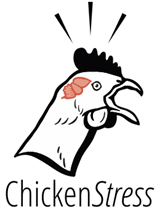Marie Skłodowska-Curie Action ETN ChickenStress
The Marie Skłodowska-Curie Action ‘ChickenStress’ is a European training network consisting of 12 beneficiaries and 9 partner organizations, amongst which 14 early-stage researchers (ESRs) will be based and seconded, where they will be trained toward becoming future leaders in the science of stress in poultry and the commercial application of solutions to maximize poultry welfare and productivity.
The project is coordinated by Dr. Tom Smulders (Newcastle University, United Kingdom), and runs from May 2019 to June 2023.
Project description
The modern public attitude toward animal farming has led to a demand for increased welfare in farm animals. With respect to laying hens, this has led to a European ban on battery cages, as alternative systems are perceived as enabling higher welfare. However, alternative systems themselves are associated other welfare challenges, such as increased risk of disease and injury, as well as higher incidences of feather-pecking and cannibalism. Aside from the obvious welfare concerns, these issues also pose an economic problem for producers. As these are multifaceted problems requiring myriad concerted strategies to combat, ChickenStress brings together various scientific disciplines and industry stakeholders to enable an interdisciplinary and integrative approach in evaluating management practices that may alleviate these problems and increase productivity.
Related to some of these welfare challenges, and representing a challenge in itself, is chronic stress in laying hens. ChickenStress will look to gain further insight into the stress response in chickens, using an interdisciplinary approach to examine the three broad categories of factors of variation in the stress response: 1) genetics; 2) the early-life environment; and 3) the adult environment. ChickenStress will therefore lead to a better fundamental understanding of the stress response in chickens, as well as an evaluation of management practices that may increase laying hen welfare by reducing chronic stress, feather-pecking and cannibalism.
In bringing together leading experts from the scientific community as well as the European egg industry, ChickenStress will provide a unique training environment for the 14 ESRs, preparing them to become future leaders in this industry. Each ESR will fulfill two secondments at other beneficiary or partner organizations – for those based at an academic institution, one secondment must be a non-academic partner, and vice versa – giving the ESRs an interdisciplinary and integrated experience within the field of chicken research and the egg industry. Furthermore, training these future leaders will enable Europe to remain at the forefront of the field, and improve the welfare of the billions of chickens raised here annually.
Objectives
These are the objectives of ChickenStress:
- Coordinate an international training network of 12 beneficiaries and 9 partners to train 14 ESRs in academic and transferable skills, and effective scientific communication to diverse stakeholders in the context of animal science and the farm animal industry.
- Train the 14 ESRs in an interdisciplinary and integrative approach to further our understanding the genetic, neurobiological and environmental factors that influence the stress response in poultry.
Role of Ghent University
Ghent University is a ChickenStress partner organization, enabling PhD registration for the ESR based at Instituut voor Landbouw-, Visserij- en Voedingsonderzoek (ILVO).
Website
Contact
Prof. Frank Tuyttens
Department of Nutrition, Genetics and Ethology
T +32 9 272 26 05
frank.tuyttens@ugent.be
